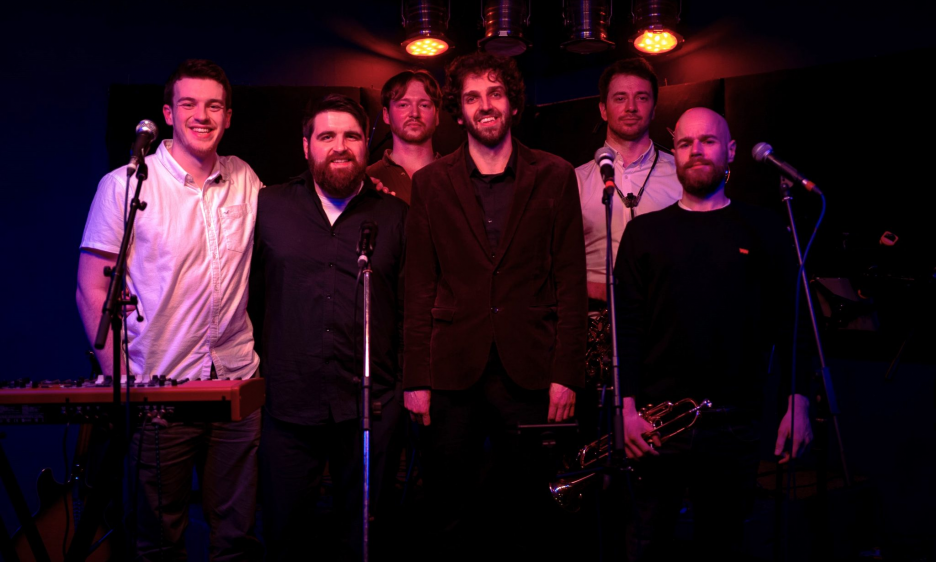Home » Jazz Articles » Interview » The Nimble Nuovication Of Nimbus Sextet
The Nimble Nuovication Of Nimbus Sextet

Nimbus Sextet represent many regions of Scotland, not simply the two main cities, Edinburgh and Glasgow. All About Jazz interviewed the band's leader, keyboardist and composer, Joe Nichols.
All About Jazz: What does the term jazz mean to Nimbus Sextet?
Joe Nichols: Jazz is quite a broad-brush term now, but I do think of it as a canvas, which can be filled by many different musical and sonic palettes. Jazz for me is the spirit of improvisation, which experiments with and reinterprets the popular music forms around it. Fletcher Henderson was paving the way for this in the 1920s, and 100 years later, more of us are doing it than ever before. Jazz has come kind of full circle in that way. I grew up with Faithless and Horace Silver as well as Tinariwen and War, so it has always been important for me to express the different sides of my musical upbringing in my compositions. I don't like to hang around on one genre motif for long. I let all the colours shine through, and evolve episodically throughout a piece. The songwriting becomes multi-faceted and the music more exciting that way. I don't want to put up boundaries around jazz, or write in one style or 'box.' I let all the sounds in. That is a big part of what I'm doing with Nimbus Sextet, and I tie it together with melodies that stand out from the canvas, that you will remember and sing.
AAJ: We heard you met each other in both Glasgow and Edinburgh, so tell us more. How did you connect?
JN: Since moving to Edinburgh from Aberdeen for university in 2013, I've had really strong ties with the capital city and Glasgow. I cut my teeth musically in Edinburgh and then moved to Glasgow to seek wider musical opportunities, where I've been living for the last six years. Nimbus Sextet is really a mixture of people I've collaborated with in both cities along the way. I met the horn players, trumpeter Euan Allardice and saxophonist Michael Butcher, and guitarist Samuel Parkinson soon after I came to Glasgow, and I began working with drummer Jack O'Rourke and bassist Stephen Jack in Edinburgh. Some of them have studied music, while others like Stephen and myself are self-taught. It is a real pleasure to bring players from these two musically rich cities together.
AAJ: Why jazz in Scotland?
JN: Scottish jazz has recently entered a bit of a golden age. Scottish groups and artists are now among the leaders in UK jazz, performing at the top clubs and festivals in Britain and Europe. It is exciting for us to be one of the spearheads of this movement. There are now many good young players coming through Tommy Smith's jazz course at the Royal Conservatoire of Scotland in Glasgow, but there are also vibrant DIY musical communities throughout Scotland that make Scottish jazz the particularly diverse melting pot that it is. Scottish folk musicians, West African artists and electronic music producers all collaborate with the jazz community here. The press buzz has generally been around 'the Glasgow jazz scene,' and you would be forgiven for thinking that this is where the whole new wave of Scottish jazz is happening. The reality is that the players in Edinburgh and the rest of Scotland are an equally important part of the current success of Scottish jazz. Jack and Stephen are two brilliant young players who grew from the Edinburgh jazz scene. Sam is from Orkney, and our regular guest trombonist Chris Small lives in Perth. Euan and I are from Aberdeen. I've always made a conscious effort to look beyond Glasgow for musicians to collaborate with in Nimbus Sextet, and to shine a light on jazz musicians from Scotland more widely. Together, we have performed at Ronnie Scott's and New Morning in Paris. The pool of talent in Scotland is more widespread than many people might realise.
AAJ: You have just released your new single "Searching," featuring two Scottish vocalists Lissa Robertson and Russell Stewart. What made you decide to take on this classic Roy Ayers song?
JN: My producer Wayne Dickson and I had been thinking for ages about a song to cover, that we both knew Nimbus Sextet could make their own. When Wayne suggested the Roy Ayers tune, "Searching," I thought about Scottish vocalists who could do the song justice, and I immediately heard Russell Stewart singing over it. His soft vocal tones are just perfect for it, so that was what clinched it for us. Taking on such an iconic tune and making it sound like us was a rewarding challenge. We brought more modern hip-hop elements to the groove and production, we changed some of the chromatic parts and featured trumpet and guitar solos instead of sax and vibes. It was the vocalists that really elevated it though. The combination of Russell and Edinburgh based vocalist Lissa Robertson voices together are gorgeous. Having a male and female vocalist together added a new element, and was different from Erykah Badu's all-female vocal rendition on her 1997 Live (Kedar Universal) album too. Lissa was fantastic. She listened in-depth to the various versions of "Searching" and found some recent live footage where Ayers had added new lyrics to the second chorus: "searching for inspiration... searching for communication." Completely independently, she learned these vocal parts and suggested we add them to the final verse instead, to lift the arrangement at the end of the song. Lissa and Russell sound amazing together here. This change really made our version feel distinct, and like the episodic Nimbus Sextet record we had always wanted to make. They were a real joy to work with.
AAJ: You are obviously in an enviable position on the UK club scene. How do you manage the best work/life balance?
JN: In the last couple of years, we've performed to packed and sold out audiences at Ronnie Scott's, New Morning, Pizza Express Jazz Club, Glasgow Jazz Festival and the Edinburgh Festival Fringe among others. We signed to Acid Jazz Records in 2019 and released our first two albums Dreams Fulfilled (2020) and Forward Thinker (2022). We have since received major support from Jazz FM, as well as Jamie Cullum on BBC Radio 2, the UK publication, Jazzwise, and many more internationally. The process of getting here took years of hard work. While I have had a label, management and agents around me, I am always a big part of organising everything: tours, rehearsals and of course the long but amazing challenge of producing our records.
It is a constant process of dedication and commitment, and it is both the most enriching thing in my life and the most exhausting, for all the right reasons! In an industry where things move so fast, I find rest hard to come by. We do all manage a decent enough work/life balance though. Between us, photography, reading, and the outdoors are all part of our ways of unwinding.
AAJ: With the single "Impulsive" you are moving into third album territory. Reflecting on your first and second albums, how do you feel your expression has changed? What are you saying now that you didn't say before?
JN: The upcoming third album we are preparing is a real departure from our two previous albums. Jazz-funk was quite a strong part of what we were doing during our Acid Jazz years, but it doesn't really feature in any of the music I am writing now. I also changed the personnel recently ahead of recording the album; they are bringing something fresh and we are taking the sound in a completely new direction now. I am consciously moving things in a more world music-and dance music-oriented direction, while at the same time getting deep into post-bop and modal jazz territory. "Impulsive" is already making the transition to world jazz, with Afro-Cuban polyrhythms and strong nods to the modal giants of the '60s. We debuted a lot of this music during a 12-date UK tour last summer, so we are now fully primed and ready to record the album. I can't wait to see where it will take us.
AAJ: Which direction has your music taken you that you didn't expect?
Joe Nichols: Nimbus Sextet have been making headway in Europe over the last couple of years, but the way this began wasn't what we had expected. In early 2022, I felt that New Morning in Paris would be the perfect place for the Forward Thinker album launch show. We hadn't played a European show yet, and with no in-roads to the venue at first, I asked my publisher if they knew anyone in Paris that could help. The next minute we were in touch with Ness Afro, who regularly DJs at New Morning, and we'd landed the album launch show for the night before the release. We then performed a live radio session on the Radio France Internationale (RFI) Musique du Monde programme—the French equivalent of the BBC—which was followed by a TV review of the album on Canal Plus and a string of great reviews from top French jazz journals such as Jazz Magazine and Star Wax. The positive response and uptake from the French market was very welcome, and it all happened because we put the feelers out about a New Morning show. As a result, we've recently started working with a European agent, setting the groundwork for all that we'll do in Europe over the next couple of years to promote the new album. I am glad that I trusted my instincts!
AAJ: Band leadership is a tricky beast. How do you create the right environment?
JN: The important thing for me with this kind of music is to create an environment that gives each player the chance to express themselves as soloists, on the tunes that suit their musical personalities. The album recording process really brings this into focus, because it means I can give them the chance to make their mark on record in a meaningful and lasting way. I have to think carefully about which tunes will allow each soloist to shine the most, and that fits the aesthetic of each individual record best. I always give everyone a spotlight for live shows too, and do simple things like smiling and communicating with the players on stage so we have synergy.
AAJ: Who is your main jazz icon?
JN: Herbie Hancock and The Headhunters. Nobody has inspired me more with their open-mindedness about jazz. From Maiden Voyage (Blue Note, 1965) to Thrust (Columbia Records, 1974) and Possibilities (Hear Music and Vector Recordings, 2005), he continuously draws from the innovative sounds around him, but always has something original to say.
AAJ: Who would you like to collaborate with if you only had one day left on earth?
JN: MeShell NdegeOcello. Her bass playing, her vocal style, her songwriting... I would die happy if she was on one of my records!
AAJ: What influence does AI have on the Nimbus sound? Are you All In or Antique IT?
JN: Antique it! Our production team Nuovi Fratelli—Wayne Dickson and Luigi Pasquini—purposely go for a more analogue approach, blending this with more modern production values... No AI!
AAJ: When you are exhausted by expressing yourself creatively, how do you recharge?
JN: Birdwatching, which I've been doing for as long as I can remember. When I am watching birds, I retrain my focus onto the outside world, which really helps take my mind off self-absorbing creative projects. Music and birds have shaped who I am, and they are an equal part of me. I have spent my life forming spiritual bonds with the places that I've come to know intimately through looking at and listening to birds, but up till now I'd always kept it separate from my life as a musician and composer.
I've realised lately that I want to bring my music and birds together. For the first time, I recently wrote a composition combining real birdsong and music, which will feature on the upcoming album. Birds will always help me to recharge, but I am excited that they will now also open up a fresh new path in my career, as I begin to write more music that draws on my life with birds and explore a new side of my creativity.
AAJ: Without giving the game away too much... can you suggest six impulsive words for what to expect from the new album...
JN: Vocals, birdsong, flute, synths, global jazz, musical migration...
Tags
About Nimbus Sextet
Instrument: Band / ensemble / orchestra
PREVIOUS / NEXT
Support All About Jazz
 All About Jazz has been a pillar of jazz since 1995, championing it as an art form and, more importantly, supporting the musicians who make it. Our enduring commitment has made "AAJ" one of the most culturally important websites of its kind, read by hundreds of thousands of fans, musicians and industry figures every month.
All About Jazz has been a pillar of jazz since 1995, championing it as an art form and, more importantly, supporting the musicians who make it. Our enduring commitment has made "AAJ" one of the most culturally important websites of its kind, read by hundreds of thousands of fans, musicians and industry figures every month.
























